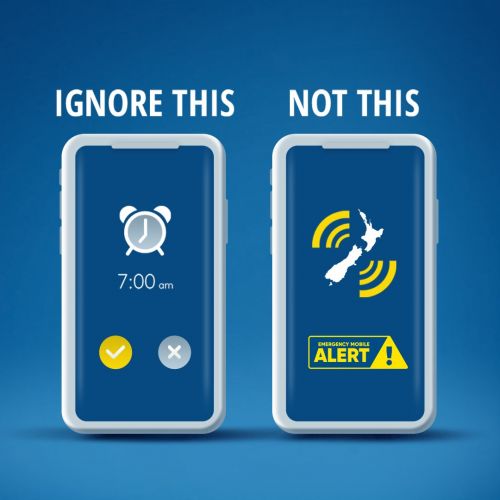This year’s nationwide test of the Emergency Mobile Alert system takes place on Sunday 22 May, between 6pm and 7pm.
Emergency Mobile Alert is an important way to alert people to threats to their life, health or
property in an emergency.
The alert uses cell broadcast technology to send the alert to all capable mobile phones in New Zealand, meaning there is no need to subscribe or download an app – all you need is a mobile phone capable of receiving Emergency Mobile Alerts, and a network signal.
Testing the Emergency Mobile Alert system helps NEMA to check their systems, the cell towers and your phone’s ability to receive an Emergency Mobile Alert.
This will be the fourth nationwide test – with the last taking place in 2019. You may have also received alerts about real emergencies such as COVID-19 or the tsunami event last year.
Emergency Mobile Alert is a key tool that can be used to help keep people in New Zealand safe in an emergency, however it does not replace other ways to stay informed, like radios or social media or the need to act on natural warning signs. If you feel your life is in danger don’t wait for an official warning. Remember – if an earthquake is long or strong, get gone.
For more information on Emergency Mobile Alert and to see if your phone can receive the alerts, visit the 'Get Ready' website.
What you need to know:
- No need to subscribe. You don’t need to sign up or download an app. Just make sure your phone is on and capable of receiving an alert, and your operating system is up to date. You can find out whether your phone can receive the alerts here.
- Works by geo-targeting. Emergency Mobile Alerts can also be targeted to affected areas, so you will only get them if the emergency is in your area. Sunday’s test alert will be sent to all areas in New Zealand with mobile coverage.
- You can’t opt out. As Emergency Mobile Alert is about keeping you safe, you won’t be able to opt-out. Your phones may show optional settings used in other countries, but in New Zealand we will use a special broadcast channel that is permanently on.
- Who can send an alert? Emergency Mobile Alert messages can only be sent by the National Emergency Management Agency, Civil Defence Emergency Management Groups, NZ Police, Fire and Emergency New Zealand, the Ministry of Health and the Ministry for Primary Industries. Alerts will only be sent when there are serious threats to life, health and property, and, like this month, for test purposes.
- Don’t ditch the radio. Emergency Mobile Alert is an additional channel to help keep people in New Zealand safe in an emergency and does not replace other alerting channels such as radio, television, websites and social media, or the need to take action after natural warnings. If you feel your life may be in danger, don’t wait for an official warning. Take immediate action. Remember – Long or strong, get gone.
- What if I’m driving? If you are driving when you receive an alert, wait until it is safe to stop and then check the message.
- Make a plan. Take the time to make your own emergency plan which includes what to do,
where to go, who can help you and who might need your help. You can make a plan online here.

Emergency Mobile Alerts
- Emergency Mobile Alerts are messages about emergencies sent by authorised emergency agencies to capable mobile phones.
- An Emergency Mobile Alert is a way of receiving information about emergencies in your area.
- EMA need to routinely test to make sure the system is working well.
- You can find out if your mobile phone is capable of receiving the messages by checking the list on the 'Get Ready' website.
- Your phone may not be capable even if it is on the list if it has not been set up to receive cell broadcast (eg some parallel imported phones)
- Find out more about EMA here.
- The Emergency Mobile Alert message you receive on Sunday 22 May between 6pm-7pm is a test of the EMA system.
- Because emergency mobile alert is sent by cell-broadcast, there is no option to opt out of receiving the test or alerts.
- Emergency Mobile Alert is one way of receiving information about emergencies, it will never be used in isolation.
- A form will be available on the Civil Defence website for people to provide feedback on the test.
- It's important to know the different ways you can stay informed during an emergency.
- Radio: If the power goes out, a solar or battery powered radio (or your car radio) can help you keep up to date with the latest news. In an emergency, tune to these stations: Radio New Zealand, The Hits, NewstalkZB, MoreFM
- Online - For local updates, check council’s website, as well as your local Civil Defence Emergency Management Group website and social media. National updates will be available on the Ministry of Civil Defence & Emergency Management's website and @civildefence Twitter feed.
- Neighbours – Get to know your neighbours so you can help each other while civil defence and emergency services are busy helping people who need them most. Get involved in your community and get to know your neighbours before an emergency happens.
